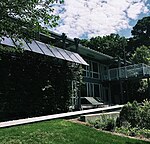Powe House
Durham County, North Carolina Registered Historic Place stubsHouses completed in 1900Houses in Durham, North CarolinaHouses on the National Register of Historic Places in North CarolinaNational Register of Historic Places in Durham County, North Carolina ... and 1 more
Neoclassical architecture in North Carolina

Powe House is a historic home located at Durham, Durham County, North Carolina. It was built in 1900, and is a two-story, Neoclassical style frame dwelling with a large hip-roofed core and pedimented wings. When built, it featured a one-story wraparound porch and an overlapping two-story portico at the central entrance bay.It was listed on the National Register of Historic Places in 1985.
Excerpt from the Wikipedia article Powe House (License: CC BY-SA 3.0, Authors, Images).Powe House
West Pettigrew Street, Durham
Geographical coordinates (GPS) Address Nearby Places Show on map
Geographical coordinates (GPS)
| Latitude | Longitude |
|---|---|
| N 36.005 ° | E -78.919722222222 ° |
Address
West Pettigrew Street
27705 Durham
North Carolina, United States
Open on Google Maps







